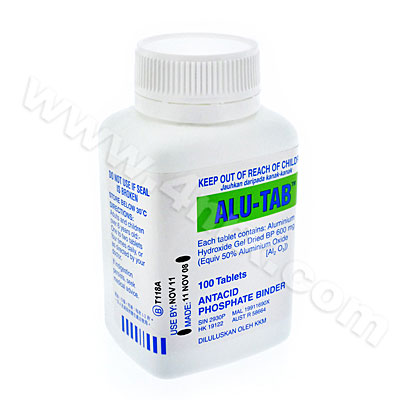 |
Home  General Health General Health  Alutabs (Aluminium Hydroxide) Alutabs (Aluminium Hydroxide) |
|
|||||||||
|
Alutabs (Aluminium Hydroxide)
What is Alutabs (Aluminium Hydroxide) used for? Alutabs (Aluminium Hydroxide) is a type of antacid which contains aluminum. It is given to patients with kidney problems to help remove phosphate from the blood, thereby helping to prevent renal bone disease and itchiness. It may also be used to treat heartburn, upset stomach, indigestion and stomach acidity. How should I use Alutabs (Aluminium Hydroxide)? Patients who are using Alutabs (Aluminium Hydroxide) should always consult their physician before taking this medication so that the correct dosage can be prescribed. The exact dosage prescribed will vary, depending on which condition is being treated. If you are using it to treat kidney problems, you may be directed to take it 4 times per day. Adults using it to treat heartburn or other digestive problems may be instructed to take one tablet 4 times per day and one more at bedtime. Never exceed the dosage prescribed to you by your physician. What are the side effects of Alutabs (Aluminium Hydroxide)? Some patients taking Alutabs (Aluminium Hydroxide) may notice constipation. Other more serious side effects requiring immediate medical attention include:
Please Note Strictly follow all instructions provided to you by your physician or pharmacist while using Alutabs (Aluminium Hydroxide). Optimum and safe dosage can differ based on the patient and the condition being treated. As this medication may be unsafe for certain patients, it is essential you always inform your physician if you are pregnant or breastfeeding, as well as if you have any allergies, other illnesses, or ongoing health conditions, and if you are taking any other form of medication, supplements, or herbal products. Patients suffering from chronic kidney failure who are taking this medication on a long term basis should note that aluminum can accumulate in the lungs, bone and nerve tissue. The accumulation of aluminum in the brain may cause dialysis dementia. Discuss all potential risks with your physician before taking this medication. Immediately seek emergency medical care if you have any allergic or hypersensitive reaction. Common signs of a reaction include hives, swelling, skin rashes, chest pains, as well as trouble breathing or swallowing. 
|
|||||||||||||||||